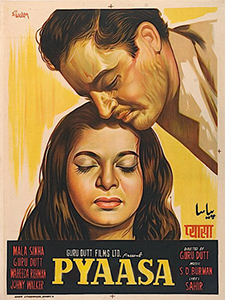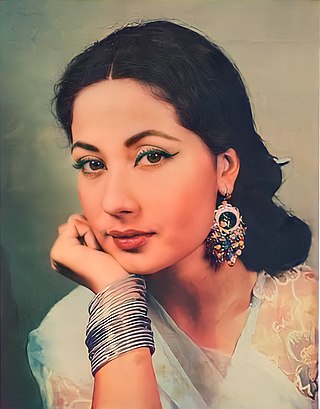
Kumudlal Ganguly, better known by his stage name Ashok Kumar and also by Dadamoni, was an Indian actor who attained iconic status in Indian cinema. He was a member of the cinematic Ganguly family.

Vasanth Kumar Shivashankar Padukone, better known as Guru Dutt, was an Indian film director, producer, actor, choreographer, and writer. He is regarded as one of the greatest filmmakers of Indian cinema.

Uttam Kumar, popularly known as the Mahanayak, was an Indian actor, producer, director, script writer, composer, and singer who predominantly worked in Bengali cinema. Kumar was one of the most successful actors in Bengali cinema history.

Pyaasa is a 1957 Indian Hindi drama film directed and produced by Guru Dutt, who stars alongside Mala Sinha, Waheeda Rehman, Rehman, and Johnny Walker. Set in Calcutta, it focuses on the disillusioned Urdu poet Vijay (Dutt), whose works are underestimated by publishers and panned for writing on social issues rather than romantic topics. The film follows his encounters with the golden-hearted prostitute Gulabo and his former girlfriend Meena (Sinha), how the former helps him to get his poetry published, the success of his works, and his romantic relationship with Gulabo.

Meena Kumari was an Indian actress and poet, who worked in Hindi films. Popularly known as The Tragedy Queen, she was active between 1939 and 1972. Kumari is widely considered one of the greatest actresses of Indian cinema. In a career spanning 33 years, from child actress to adult, she starred in over 90 films before dying, at 38, from cirrhosis of the liver associated with her alcoholism.

Kismet (transl. Fate) is a 1943 Indian drama film, directed by Gyan Mukherjee, written by Mukherjee with Aghajani Kashmeri, and produced by Bombay Talkies, during the Second World War, while it was in a succession battle between Devika Rani and Sashadhar Mukherjee after owner Himanshu Rai's death. The film was the first big hit in the history of Bombay cinema, and the first blockbuster in Indian cinema.

Sahib Bibi Aur Ghulam is a 1962 Indian Hindi-language drama film that was directed by Abrar Alvi and produced by Guru Dutt, who also co-stars in it alongside Meena Kumari, Rehman, and Waheeda Rehman. The film, which is based on Bimal Mitra's Bengali-language novel Saheb Bibi Golam (1953), is set in the 19th century during the British Raj and focuses on Bhoothnath (Dutt), who meets Chhoti Bahu (Kumari), the lonely wife of a zamindar (Rehman). The film follows Chhoti Bahu's effort to keep her husband—who likes drinking and watching prostitutes perform—at their home by drinking with him. She becomes addicted to alcohol, leading both of them into bankruptcy.

Sabitri Chatterjee is an Indian actress who is known for her work in Bengali theatre and cinema. Her career spans more than 60 years. She is the recipient of BFJA Awards for two times. In 1999, she was conferred with Sangeet Natak Akademi Award for Acting in Bengali theatre. In 2013, she was awarded by the Government of West Bengal its highest civilian award; the Banga Bibhushan. In 2014, Government of India conferred upon her its fourth-highest civilian award the Padma Shri.

Tamil cinema, also known as Kollywood is a part of Indian cinema; primarily engaged in production of motion pictures in the Tamil language. Based out of the Kodambakkam neighbourhood in Chennai, Tamil Nadu, it is popularly called Kollywood - a portmanteau of the words Kodambakkam and Hollywood. The first Tamil silent film, Keechaka Vadham, was directed by R. Nataraja Mudaliar in 1918. The first Tamil talking feature film, Kalidas, a multilingual directed by H M Reddy was released on 31 October 1931, less than seven months after India's first talking motion picture Alam Ara.

Abrar Alvi was an Indian film writer, director and actor. Most of his notable work was done in the 1950s and 1960s with Guru Dutt. He wrote some of the most respected works of Indian cinema, including Sahib Bibi Aur Ghulam, Kaagaz Ke Phool and Pyaasa, which have an avid following the world over. Pyaasa is included in the All-Time 100 Movies by Time magazine, as chosen by critics Richard Corliss and Richard Schickel.
Paradise Cinema is a single screen cinema hall located in Bentinck Street (Esplanade), Kolkata, West Bengal, India. This cinema hall was inaugurated in 1943 and was fully renovated in 1956. The current managing director of the theatre is Arun Mehra.

Globe Cinema was a single screen cinema hall and heritage building located in Lindsay Street, Kolkata, West Bengal, India. The theatre was previously known as Old Opera House. The wooden opera house was established in 1827 and sold to E M Cohen in 1906. Cohen converted it into a movie theatre and named it Globe Cinema. The theatre was owned by Sidhwa family and Jal Tata. Dhansri Abasan Pvt Ltd partnered with Goldstar Enclave Pvt Ltd and acquired the Globe Theatre Pvt Ltd from them.
Lighthouse Cinema was a single screen cinema hall and heritage building located in Humayun Place in New Market, next to New Empire, Kolkata, West Bengal, India.
New Empire Cinema is a single screen cinema hall located in Humayun Place in New Market,, Kolkata, West Bengal, India. This theatre is next to Lighthouse Cinema.

Chaplin Cinema was the oldest single screen movie theatre in Kolkata, West Bengal, India. It was located in 5/1 Chowringhee Place. In 1907 Jamshedji Framji Madan opened this cinema in India.
Jyoti Cinema is one of the most popular and oldest single-screen movie theatres of Kolkata, West Bengal. The hall is located in Lenin Sarani.

Gyan Mukherjee was an Indian film director and screenwriter, who worked in Hindi cinema, best known for the hits Jhoola (1941) and Kismet (1943).

Noor Mohammed Charlie (1911–1983), popularly known as Charlie, was a Pakistani actor born on 1 July 1911 in Ranavav village, Porbandar, Saurashtra, British India. Best known for his comedy roles, he was the first 'star' comedian and has been referred to as India's first comedy king. He acted with several top actresses of those days as a comic hero. Being a great fan of Charlie Chaplin, he took the name "Charlie" as his screen name following the release of his popular film The Indian Charlie (1933). He had a successful career in pre-partition India from 1925–1946. His shift to Pakistan following partition saw his career going down with less than 12 films. He shifted to the US to live with his son and returned later to Pakistan where he died in 1983.

Ten Years with Guru Dutt is a biography of Indian filmmaker Guru Dutt that was written by journalist Sathya Saran. It is based on Saran's conversations with the screenwriter Abrar Alvi about Dutt and Alvi's collaborations, which began when they met on the sets of Baaz (1953) and ended with Dutt's death in 1964. This information was compiled into a 23-chapter book with first-person narrative interspersed with Saran's commentary. Penguin Group published Ten Years with Guru Dutt on 25 July 2008.














